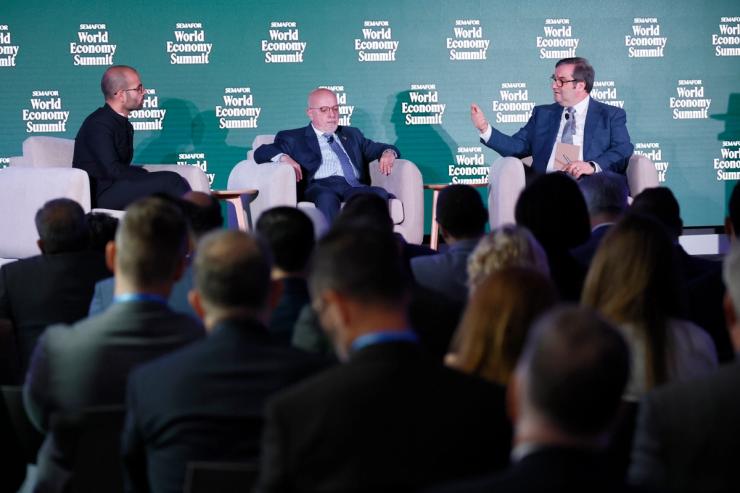The News
After 13 years of civil war and six decades of dictatorship, Syrian officials tasked with restarting an economy that has resembled Cuba’s or North Korea’s insist that they need to build new institutions, and not rebuild those that led to the country’s collapse.
Speaking at Semafor’s World Economy Summit on Thursday, Syrian central bank governor Abdulkader Husrieh said his ask in meetings in Washington is for “technical assistance” and support to be “part of our plan for construction.”
Decades of sanctions mean Syria’s banks and businesses have not been integrated into the global financial system, and both private companies and government lack the expertise to quickly develop policies and practices to do it.
In addition to requesting the removal of sanctions, so that the investors can be comfortable to back projects, Syrian Minister of Economy and Industry Nidal al-Shaar urged patience.
“If we miss this opportunity, Syria is gone. You will never be talking about it. It will be diced and sliced, and we are cognizant of that,” he said. “We are so careful to do it the right way, and sometimes we are accused of being slow or not being able to deliver… Please give us the time. We are emerging from scratch, from ruins, from wreckage.”
Know More
Despite this destruction — data isn’t accurate, but there are high rates of extreme poverty and unemployment in Syria, and dozens of towns and cities have been razed — both officials pointed to opportunities to leverage the country’s natural resources and strategic location as a node for trade between the Gulf and Europe.
Al-Shaar, who compared Syria to a newborn baby, said it would be a natural fit for his country to partner with Gulf nations in the country’s construction: “This is our destiny… it’s not a choice, it’s not an option,” he said. “We have to have that kind of relationship, and those guys are coming with the same mentality, with the same excitement.”
He said Damascus is “not looking for” loans, aid, and donations — though “of course we’re not going to refuse it if it comes” — and is instead focused on finding lasting partners who will invest in the country’s growth.
On the political front, al-Shaar praised the efforts of interim President Ahmed al-Sharaa, who met with Russian President Vladimir Putin in Moscow yesterday — an unexpected sight, given Russia launched airstrikes on the territory that al-Sharaa controlled in Idlib province when he was a rebel commander (and former al-Qaida leader).
The minister said Syria intends to be a stable country, “friendly to everyone, especially neighbors,” and that this approach will make investors feel safe.
The central bank governor echoed the sentiment, noting that “good management doesn’t fix bad policies.” Without a stable foreign policy — a departure from Syria’s past bullying of the region — technocrats won’t be able to craft the economic, fiscal, monetary, and trade policies that “are conducive” to achieving targets.


